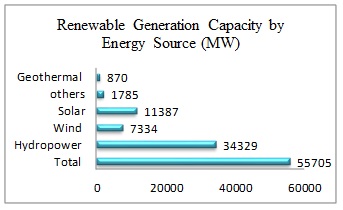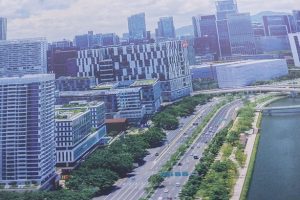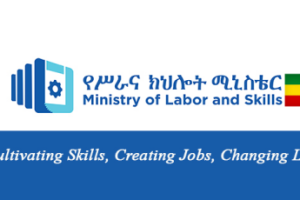
BY WONDIMU TEKLE SIGO (PhD, Eng)
PART I
Modern energy in the form of electricity is vital for unlocking economic potential such as for getting clean water, healthcare, and education, for getting stable and effective lighting, heating, and cooking, as well as job creation. Sub-Saharan Africa has not discovered, but technically explored, energy resources expected at about 21.05 trillion cubic meters of gas and 115.34 billion barrels of oil. Similarly, Africa’s renewable energy resources are various, randomly distributed, and vast in the quantity that is almost abundant hydro (350 GW), geothermal energy sources (15 GW), wind (110 GW), and unlimited solar potential (10 TW) (UNEP, 2017).
The entire generation capacity from renewables and fossil fuels in Africa as of 2019 was 232 GW, of which installed renewable energy from hydropower, the solar, wind, and geothermal accounts for only 56 GW. Hydropower accounted for the largest share of the African total, with a capacity of 34.33 GW (67%). Solar, wind, geothermal, and other renewable energy accounted for capacities of 11.39 GW (20%), 7.33 GW (13%), 0.9 GW (2%), and 1.79 GW (3%) respectively.
However, in most African countries, there is a huge shortage of electricity, frequent interruptions, and big gaps in access. According to the world development indicator data, 600 million people, or 43% of the total population lack access to electricity, most of them in Sub‐Saharan Africa. In Sub-Saharan African countries, about 45 percent of people are leaving without electricity and most of them exist in rural areas (World Bank,
2016). As shown in the figures access to electricity (% of the population) in Sub-Saharan Africa reached about 48% in 2020 from 26% in 2000. On the other hand, those populations that have access to electricity in urban (% of urban population) reached 78% in 202020 from 62 % in 2000; while rural access to electricity (% of rural population) only reached 29% in 2020 from 12% in 2000. Therefore, to increase the population’s access to electricity needs to be improved; especially much attention needs to maximize electricity access creation in rural areas.
Similarly, access to clean fuels and technologies for cooking in Africa is very low. As shown in the figures access to clean fuels and technologies for cooking (% of the population) in Sub-Saharan Africa reached about 48% in 2020 from 26% in 2000. On the other hand, those populations that have access to clean fuels and technologies for cooking in urban (% of urban population) reached 35% in 2020 from 23 % in 2000; while rural access to electricity (% of rural population) only reached 6% in 2020 from 3% in 2000. Therefore, to increase the population’s access to electricity needs to be improved.
In addition to the lowest electricity access in the world the most recent World Bank Doing Business 2020 report, customers in 10 of the 24 African participants (42%) experienced on average at least 24 hours of outages over the period May 2018–May 2019, while 19 (79%) experienced at least 2 hours of outages. Due to these facts average electricity consumption in sub-Saharan Africa, excluding South Africa, is only about 180 kWh per capita, whereas in the United States and Europe 13,000 kWh and 6,500 kWh per capita respectively (AfDB, 2017). But the source of electricity in most developed countries is fossil fuels, which has been contributing to global warming.
Renewable energy and sustainable development are essential expressions for human beings since renewable energy is clean and not hurtful and is important for sustainable development that reserves resources for future generations. Though Africa has huge renewable energy potential there are different outstanding challenges in the electric sectors such as ineffective and inefficient electric institution setup that has been causing inadequacy of electric power supply and frequent interruption; dissatisfaction over the poor technical and managerial performance; and the inability of utilities to setup their tariff and mobilize sufficient investment capital. Therefore, to examine the cause of the above outstanding challenges it is better to see each of them one by one:
1. Ineffective and Inefficient Electric Institution Setup
Around the globe, electric utilities/institutions are administrated by either public or private or both as public-private ownership. The enactment of the utilities/institution also varies from country to country. According to Holburn and Spiller (2002):
“Some countries have invited private investment in the generation sector only, financed by long-term supply contracts to state-owned utilities (e.g. China, India, Indonesia, and Mexico); some have vertically separated the industry but only privatized part of the sector (e.g. Colombia, El Salvador, Kazakhstan, and New Zealand); while others have privatized the entire industry and additionally created competitive generation markets (e.g. Argentina, Chile, and the U.K.) (Holburn, G. L. F., & Spiller, P. T., 2002)”
The electric institution’s arrangements in most African countries are similar to the first option. As per this option, most African countries allow the involvement of the private sector in the generation to sell electricity to public utilities. In other words, public utilities are involved in all activities of the power sector starting from generation to distribution. The justification of the government to insist on the presence of the public institution is due to a society’s low per capita income that couldn’t afford to pay the electric tariff that may be forced by the private sectors as they will put huge profit margin with the principle of free-market.
Moreover, if the public utilities withdraw from the execution of the power infrastructure development in the rural areas where most the society lives couldn’t get electric access easily. In the past, without proper investigation, some African countries had pushed to privatize the electric power sector through multilateral organizations but that created huge mess-ups without access electricity to for the people. Hence, other African countries are afraid of the involvement of the private sector and the electric institutions are almost owned by the public or state that is managing from generation to electric market distribution, which is so huge and difficult to manage as a single institution.
Therefore, the electric utilities are not effective and efficient in delivering their tasks but they are enjoying a monopolistic power over the sector, which caused shortage and interruption of electric power, dissatisfaction over the poor technical, financial, and managerial performance as well as the inability of utilities themselves and the government to mobilize sufficient investment capital for the electricity subsector’s development and expansion.
2. Inadequacy of electric power supply and frequent interruption
As we have seen above due to the electricity access problem and shortage of electric power supply, Africa’s electricity consumption per capita is the lowest in the world. Several citizens’ customers are waiting for electric power service but they didn’t get it for many years due to a shortage of electric power. Even those who got electric power service are affected by frequent power interruption due to aging of power generation, transmission, substations, and distribution lines; high electric power loss due to inefficient device & appliance usage. Therefore, to address the shortage and interruption of electric power in Africa, in addition to upgrading the whole electric system starting from generation to distribution it needs a serious solution to develop the huge available renewable energy potential for accessing electricity.
3. Dissatisfaction Over the Poor Technical and Managerial Performance
The customers are also extremely distressed by the utilities due to a lack of electric logistics, accessories, and low technical standards, hence the people couldn’t get an electricity connection to their house or service on time. These are primarily related to the lack of well-trained staff to make sure capable and proactive power system management in the areas of implementation, regulation, operation, and maintenance as well as the lack of managerial performance. Therefore, the dissatisfaction over the poor technical and managerial performance in African electricity utilities is another critical challenge that needs urgent solutions to develop renewable energy for accessing electricity.
4. The inability of utilities to setup their tariff and mobilize sufficient investment capital
The most critical challenge that contributes to all outstanding issues on African utilities is the financial status. Most utilities in Africa couldn’t set up their tariff on their own because it needs government approval. But the government won’t approve the tariff prepared by the utilities because it believes the low-income people couldn’t afford it. This is one of the signs of a government price ceiling, which creates a shortage of electricity in addition to other factors mentioned above.
Supply and demand in economics tell us, about the connotation between the goods in our case electricity that producers want to sell at various prices and the quantity that consumers want to buy at the market. The succeeding price is denoted as the equilibrium price and implies an agreement between producers and consumers of the goods; it is at this point that the quantity of goods supplied by producers equals the quantity demanded by consumers (Lumen Boundless Economics, 2019).
However, many governments have been insisting that utility companies improve the outstanding issues that are mentioned above without approving or allowing tariff revision. This fact led to reducing the utility revenue. This is a paradox as per the utility argument because they couldn’t rectify their poor performance such as increasing the electric power generation capacity, upgrading, and expanding the electricity system, operation & maintenance as well as getting efficient services unless the financial constraints are solved. Therefore, the financial constraints of the utilities in Africa need also urgent solutions to develop renewable energy for accessing electricity.
The Ethiopian Herald November 22/2022





